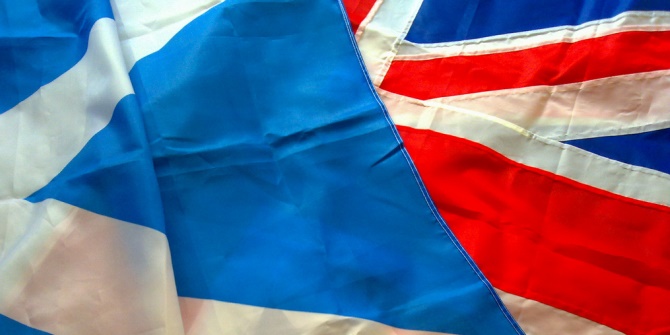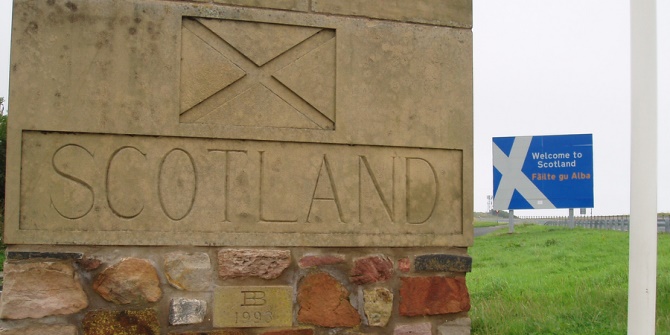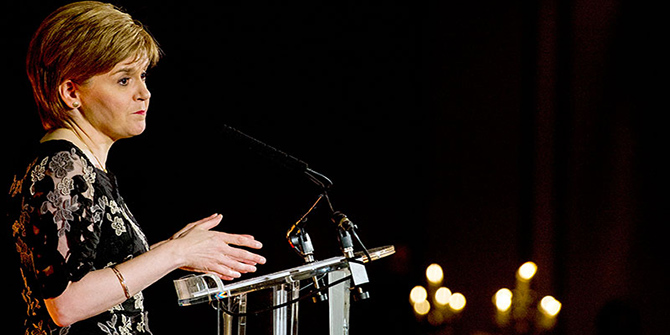 The contrast between the SNP and other nationalist movements and parties is striking, argues Elliott Green. The SNP explicitly promotes civic nationalism, claiming that membership in the Scottish nation is to be defined not by blood but by voluntary attachment to Scotland and participation in its civic life. This has paid off, with high support from ethnic minorities for independence.
The contrast between the SNP and other nationalist movements and parties is striking, argues Elliott Green. The SNP explicitly promotes civic nationalism, claiming that membership in the Scottish nation is to be defined not by blood but by voluntary attachment to Scotland and participation in its civic life. This has paid off, with high support from ethnic minorities for independence.
Normally we think of nationalism as a right-wing ideology, where members of the nation are considered superior to non-members, and the latter are excluded from becoming citizens or full members of the nation. This ideology becomes especially pernicious when membership of the nation is defined along ethnic lines, such that foreign immigrants are permanently excluded from becoming part of the nation, no matter how much they might want to assimilate.
This type of nationalism, commonly known as ethnic nationalism, is usually contrasted with civic nationalism, whereby the latter allows anyone to identify with the nation and its civic values regardless of their ethnicity. Historically the ethnic/civic divide was mapped geographically along a western/eastern divide within Europe by scholars of nationalism like Hans Kohn, who identified civic nationalism as typical of the nations of western Europe (France, the UK, Switzerland and the Netherlands, as well as Scandinavia) and ethnic nationalism as exemplified by Germany, the nations of eastern Europe and the peripheral nations of western Europe like Ireland.
This dichotomy, while simple and useful, papered over the strong ethnic divisions in western Europe that have more recently come to the fore since Kohn first wrote about this topic in 1944. The Vlaams Blok in the Netherlands, the British National Party (BNP) in the UK, the Front National in France and the Danish People’s Party in Denmark have all explicitly rejected civic nationalism in favour of some form of ethnic nationalism. The success of these parties has varied, but the fact that many of their anti-immigration policies have been taken up by mainstream parties suggests how strong ethnic nationalism remains in much of western Europe.
The current debates on Scottish independence are a fascinating contrast to this narrative. The Scottish National Party (SNP) is explicitly nationalist, not only in its name but also in its goal to create a Scottish nation-state. However, it also explicitly promotes civic nationalism, such that it has claimed that membership in the Scottish nation is to be defined not by blood but by voluntary attachment to Scotland and participation in its civic life. The SNP has been rewarded with support from ethnic minorities, such that Scots of Asian descent actually support independence at a higher rate than the rest of the population. The fact that such groups as Africans for an Independent Scotland, English Scots for Yes and Scots Asians for Yes even exist is clear evidence of how the Yes campaign is able to draw upon non-ethnically Scottish residents of Scotland who support independence.
Indeed, the contrast between the SNP and other nationalist movements and parties is striking. In the run-up to the recent European elections in May 2014 I received a flyer from the BNP, which attempted to explain to the ignorant masses how the SNP wasn’t a “real” nationalist party since true nationalism meant cutting immigration and protecting the rights of indigenous Britons. Scottish nationalism is also different in this sense from other secessionist movements. Jacques Parizeau, the Premier of Quebec who led the secessionist campaign in Quebec’s 1995 referendum on independence, infamously blamed the failure of the campaign on “money and ethnic votes,” since around 90 per cent of immigrants voted against independence. Catalan nationalism also has a quiet undercurrent of ethnic nationalism, with one former President of the Catalan Parliament complaining that “Catalonia will disappear if current migration flows continue.”
In contrast, the SNP has praised high levels of immigration into Scotland, and it was an SNP representative, Bashir Ahmad, who became the first non-white and first Muslim Member of Scottish Parliament (MSP) in 2007, followed by the election of a second Muslim SNP MSP, Humza Yousaf, in 2011. Moreover, while non-white residents of Scotland have the right to vote in the referendum on independence, those Scots who live outside Scotland but within the UK are not allowed to cast a vote. Thus those who are ethnically Scottish wholly or in part – including UK Prime Minister David Cameron, whose father was born in Scotland, and former Prime Minister Tony Blair, who was born in Edinburgh to a Scottish father – do not have the right to vote, in contrast to non-Scots resident in Scotland (including those from Commonwealth and European countries who are not UK citizens). This decision to exclude non-resident Scots from the vote only emphasizes the civic nature of Scottish nationalism, such that ethnic descent and birthplace is less important than one’s commitment to residence in Scotland.
Regardless of the outcome of Thursday’s vote, mainstream Scottish nationalism will most likely continue to be conceived as civic in origin, rather than ethnic. The question remains as to whether other secessionist movements in Spain, Canada and elsewhere will learn from the Scottish experience and pursue more a more civic conceptualization of the nation than they have in the past.
Note: This article gives the views of the author, and not the position of the British Politics and Policy blog, nor of the London School of Economics. Please read our comments policy before posting. Featured image credit: Gareth Saunders CC BY-SA 2.0
 Elliott Green is Associate Professor of Development Studies in the Department of International Development at the LSE.
Elliott Green is Associate Professor of Development Studies in the Department of International Development at the LSE.








One aspect of Scotland’s civic nationalism that isn’t explored is the influence of the media. The media is almost without exception hostile to Scottish nationalism. This means the SNP bends over backwards to avoid giving easy targets to the media.
But I wonder if Scotland had a domestic equivalent of a Daily Mail telling us how terrible foreigners are, or a BBC whose mission was to promote Scottishness, if Scotland’s political class would still be so keen to promote inclusiveness.
Our media telling us day in, day out how shite Scotland is is perhaps all that keeps the chauvinism in check.
Obviously there are Scots who hate foreigners anyway, but if they believe what they read in the Daily Mail they are more likely to be unionists rather than nationalists – or if you want to give the terms equivalence, British nationalists rather than Scottish nationalists.
Just nitpicking but the Vlaams Blok have never operated in The Netherlands but in Vlaanderen, which is part of Belgium.
The SNP isn’t unique. For SNP, see Plaid Cymru here in Wales. Plaid operates along the same internationalist/civic nationalist principles.
No it doesn’t. The Plaid leadership is civic but the Welsh are ethnic nationalist. The reason welsh and english people fear welsh independence is because of the welsh language. Non welsh speakers don’t want the language thrown down their throats. It’s the fear factor of the language that will stop the welsh nation state.
I mean No’s 2 million of course
“n contrast, the SNP has praised high levels of immigration into Scotland, and it was an SNP representative, Bashir Ahmad, who became the first non-white and first Muslim Member of Scottish Parliament (MSP) in 2007”
Look – I cant be racist against white English people I’ve got an Asian friend.
The fact is that there isn’t a large black or asian diaspora in Scotland for them to annoy.
You are just misguided. Civic Nationalism is just a mask for good old fashioned racist Nationalism. However good a mask the mask slips. Jim Sillars threatening business, people scrawling “vote Yes or else” on polling stations, harrassment of Unionist politicians.
It is based on a series of historical lies and distortions. The Union of 1707 was undemocratic but we’re supposed to believe that the declaration of Arbroath somehow was. The truth is there was a sizeable minority opposition to the Act of Union in 1707 and the same sizeable minority that voted YES in the independence referendum in 2014. Okay the Act of Union was a long time ago so let’s have another agreement. We let them chose the constituency based on civil boundaries not ethnic ones, we let them chose the question … they still couldn’t get 50% + 1 to agree only 1.6 million to No’s 1 million … 600,000 registered voters would seem to not care what nation they are in at all. Of course no one should stay in any Union at any price … but whatever deal is hammered out Scottish Nationalism will never go away. Look at the map of Unempolyment and the map of who voted Yes. They almost perfectly overly. It isn’t hard to work out what’s actually driving this. The truth is there is no great historical wrong to be righted… Civic Nationalism is a victim ideology promoting ridiculous ideas such as that Scotland was “colonised” by the English that have no basis in historical fact. Read the declaration of Arbroath “..for, as long as but a hundred of us remain alive, never will we on any conditions be brought under English rule. It is in truth not for glory, nor riches, nor honours that we are fighting, but for freedom – for that alone, which no honest man gives up but with life itself”. Which sounds great but if you read it carefully presumably that means since the English will always be a majority because there are more of us they can never join in a democracy with us? In other words there is a racial difference between the English and the Scots that can never be overcome – even by democracy? Mind you there’s no actual complete original version of the text so who knows what it really said?
Anyway international law is clear – until they can get 50%+1 they have to stay and make the best of it …like the rest of us.
Thanks for this post, Elliot. It is thought provoking. Allow me to share some of my thoughts in response.
Firstly, I have a problem with the distinction between ‘ethnic’ and ‘civic’ nationalism on a broader level than you refer directly to here. There is a very big interpretative gap between what politicians promote and what people on the ground comprehend. My problem is that both are ‘projects’ carried out by political elites, and you seem to refer to them as if the ideas behind them can be transferred to a population at large, like giving them a course of medication. It blatantly does not work like that. The SNP is a great example here. You state that they ‘explicitly promote civic nationalism’. And yet, according to recent social attitude surveys, racism is on the rise in Scotland (and the UK in general). So the ethnic nationalism on the BNP and the civic nationalism of the SNP have both brought a rise in the grass roots politics of exclusion. Clearly this distinction is obfuscating more structural factors here, and is not particularly useful when trying to work out what people actually experience on the ground.
Another example here is in your argument that civic nationalism is evident through the SNPs claims that you can be Scottish not through blood but by voluntary association. I would refer you here to the ‘Team Scotland’ slogan that has become part of the SNPs artillery of late. You are quite correct, the ‘promotion’ of civic nationalism is evident here in that pictures have been carefully stage managed to include a few people from ethnic minorities. But how has ‘Team Scotland’ been interpreted on the ground? It played directly into the ‘you’re a traitor’ ‘you’re a coward’ responses – mostly of cybernats – and created a definite ‘your with us or against us – your Scottish or you’re a traitor’ tone to the debate (which has not – as some people seem to claim – been generally conducted with surprising intelligence and polite consideration). I personally received many hate mails in my inbox for my support of the union. Look at George Galloway’s twitter and facebook feeds and you will see more evidence of this. The point here is that this peculiar form of Scottish Nationalism – be it ethnic or civic – has created a significant division between people who self identify as Scottish: Nationalism of any sort creates division and fosters the politics of exclusion on the ground, regardless of what politicians ‘promote’.
Secondly, your argument that the SNPs civic nationalism has been ‘rewarded’ by groups of ethnic minorities voting for them is problematic. Ethnic minorities have lived in Scotland for many, many more years before the SNP came to power – hundreds of thousands of people from outside of Scotland have made it their home for many decades. It is their home, many have Scottish accents, and they can chose to vote for whoever they like if they are convinced by the policy arguments made by any specific party that will have an impact on their lives. It blatantly does not follow however that ethnic minorities are treated well by Joe Blogs on the street in Scotland, or that many of them have not had to struggle all their life through intense , engrained, racism, racially motivated physical and verbal attacks. I know this. I grew up in a town outside Glasgow and witnessed uncountable racially motivated incidents – mostly in shops that we frequented daily. The owners and workers would be routinely called ‘paki’, ‘chinky’ etc, and yet Scotland is their home, they persevere with it. I left in the mid 1990s, and studies show incidents of racism are increasing. On my annual trips home, it makes me sick. The racially motivated attacks on asylum seekers throughout the country are but one example of the ways in which the politics of exclusion are central to lived experience in the region. To argue that ethnic minorities are ‘rewarding’ the SNP for their civic nationalism, in this context, seems rather farfetched – and may even border on the insulting.
Lastly, your suggestion that civic nationalism can be further demonstrated by the fact that people who live outside of Scotland (like me) cannot vote, but that those who are resident – no matter their ethnicity – can vote, also misses the point. Alex Salmond is an extremely clever politician, and this is his lifelong obsession. He has had a long time to work out that Scottish ex-pats living abroad very much enjoy – and are often largely dependant on – the exchange rate they get with their savings/pensions in pounds – the strongest currency on the planet. He knew all along that the currency debate would be a central issue in the campaign, and that those living abroad who enjoy their pounds through multiples of local currency, would recognize joining the Euro as a threat and be more likely to vote no. Those living in Scotland with no particular desire or means to leave will be less likely to have this as a serious concern. Hence the vote for residents and not for ex-pats. It was a calculated move to decrease the No vote – it was not a statement of civic nationalism. As was the reduction in the voting age from 18 to 16 an intentional attempt to capture the ‘heart’ vote over the ‘head’.
Regardless of the outcome on Thursday – the SNP have created a deep cleavage in Scottish society by bringing this referendum to fruition. The political and social landscape has been immeasurably damaged by this. It is indeed a sad day, and despite the promotion of so called civic nationalism, it will herald many social (and very possibly economic) ills for the average person on the ground.
Race hate against ethnic minorities in Scotland is not as a result of the Scottish independence campaign but the race hate peddled by the English tabloids and on the internet. Working class people are easily influenced into bullying people who are weaker than themselves or lower down the social ladder. It’s a form of bullying. If you want the bullying to stop work needs to be done to lift the standard of living of Scottish working people. Where’s there’s poverty there’s prejudice.
Scotlland’s poorest 1/4 of population is amongst the poorest in Britain, only second to Greater London with its large migrant population from Eastern Europe.
Scotland’s population has been declining for a long time up until 2004 when eastern Europen nations joined the EU and many came to work here in the UK and Scotland. Only post 2004 has the population of Scotland increased.
The reason Scottish people leave Scotland is mostly economic. Scotland is not like Norway. Scots from poor regions like Glasgow are better of leaving for greener pastures in England. The purpose of Scottish independence to to prevent the brain drain by developing a better economy similar to Scandinavia and Norway so that with a stronger economy there will be less young people leaving their place of birth.
You’re wrong to say the pound sterling is the strongest currency in the world. The UK pound is a basket case and continually falls in value. Britain is dependent on foreign direct investment to finance the massive trade deficits. When the FDI dries up post Brexit sterling will be in serious trouble. Then you’ll regret moving to England, it should have been Australia instead.
The referendum in Scotland is very difficult for Scots living in England you’ll be the subject of racism. The English will tell you to get out and you might have to return home with your tail between your legs, looked upon as a traitor by fellow Scots. This price will have to be paid but at least you’re not an Algerian returning home from France. In years to come Scotland will be much wealthier so there will be less incentive for the younger population to leave Scotland in the first place.